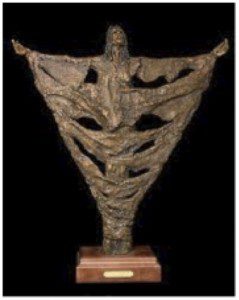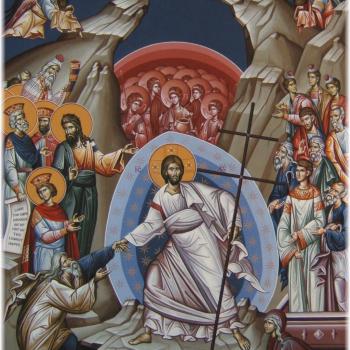
On the third day he rose again
in accordance with the Scriptures;
he ascended into heaven
and is seated at the right hand of the Father.The Nicene Creed
Moriah Olivia Kathryn Fowler was the beloved daughter of the Rev. Dr. Mark A. Fowler of Evanston, IL. and [the] cherished sister of Ben Fowler of Philadelphia, PA. She was a 2008 graduate of Lampeter-Strasburg High School in Lampeter, PA. She was an active participant in the National Honor Society, Marching Band, Concert Band, and school musicals. She played oboe with the F & M Philharmonic and she was accepted to the Doctor of Physical Therapy program at Ithaca College. She was also an active member of the churches that her father pastored in Lancaster, Pennsylvania, and Framingham, Massachusetts. And — at age 19 — she died of Hodgkin’s Lymphoma.
Moriah’s father, Mark, is a dear friend and a former colleague at Garrett, where I taught for years. Like other pastor-scholars, he had been exposed to the variety of solutions that theologians offer for the embarrassing insistence of the Christian faith on the reality of the Resurrection. And, by the time that he finished his own education, the Resurrection was little more than an archetype for new life, personal renewal, and social change.
So, though he was a pastor and a theological educator, that is the whole of what he had left by way of spiritual resources to face the loss of his daughter: the idea that if she was still alive, she would have new challenges to embrace – but she wasn’t – and that was the end of it all.
I don’t think that my friend was alone. In fact, I am pretty sure that far too many Christians have been stripped of a robust understanding of the Resurrection. And in the minds of many, it has been reduced to a bit of weak, Hallmark-card poetry.
There are lots of reasons for that. Part of the blame lies with seminary educations. Far too many clergy are shaped early on by academics, who themselves, don’t really believe in the Resurrection. Far too occupied with being academically credible, they reinterpret or drop the Resurrection from their vocabulary, hoping to gain respectability in the larger academic community where subjects like the Resurrection are considered children’s stories. So, while the day-to-day operation of seminaries are never something that the church pays much attention to, that’s where its clergy are formed. Garbage in, garbage out, garbage from the pulpit.
Another reason that people are stripped of confidence in the promise of the Resurrection is the materialist orientation of our culture. What we believe is real, is what we can hear, see, smell, taste, and touch – what we can measure – and reduce to data points. The Resurrection, of course, doesn’t lend itself to that kind of examination, so we assume that it can’t be true.
But what we overlook, is that all the data in the world doesn’t add up to meaning. And some – if not most – of the most important truths about our existence can’t be measured or even proven. Our love for one another. A mother’s love for her children. The importance of justice. The power of forgiveness. The reality of emotional and spiritual healing.
And, then there’s the appeal to personal experience. One of the strange things about the twenty-first century is that we are now – all at once – both one of the most rationalistic and irrational cultures in human history. We blather on about “the science”, and we make decisions on the basis of personal experience.
So, the reasoning goes: Resurrection isn’t a part of my personal experience, so it can’t have happened. Well, duh. I hate to break it to all of us, but we can’t build a knowledge of the world and the universe on the basis of what we’ve encounter first-hand. None of us have experienced quarks, black holes, meteor showers, or the life cycle of sub-atomic particles. That doesn’t mean that they don’t exist.
So, when you compare what we know with what we have experienced, it turns out that experience is a pretty inadequate way to go about deciding what might and might not be possible. To quote Shakespeare’s Hamlet, “There are more things in Heaven and Earth, Horatio, than are dreamt of in your philosophies.” The truth, then, is that the conclusion that the Resurrection didn’t happen, is based on nothing more than the assumption that it couldn’t have happened. What is even stranger, however, about the modern church is the number of Christians that believe they can get along without it.
The disaffection toward faith in the Resurrection, even among Christians, is in sharp contrast with the early church. From the very beginning, the Resurrection was at the heart of the church’s faith. It was considered the vindication of Jesus’s claim to be the Son of God and his claim that his death was God’s identification with our needs, the path to our deliverance. Lots of good people die. Lots of good people die for others. Only the person who died and rose from the dead can make the kind of claim that the church made.
The church also believed that in Christ’s dying, the power of death had been forever broken and that it would no longer have the last word. They believed that in the Resurrection, the path back to God had been made available to all of us. And they believed that it was the Resurrected Christ who saved them.
The early Christians were also unrelentingly this-worldly in their claims about the nature of the Resurrection. It happened in time and space. In a particular place on earth. It left an empty tomb. And when he appeared to Mary and the disciples, he was recognizable to them and had a body.
All of this made sense to them. If it hadn’t been real – if it didn’t really take place – if it was just language about how their hearts were changed or their minds were opened to new possibilities, then it wouldn’t have meant sense to them to take the risk of sharing that message with the world. Nor would they have risked imprisonment and martyrdom, abandoned their homes or trapsed across the known world sharing the news that Christ was risen.
As good Jews, they would have gone back to waiting for the Messiah – as they had for millennia. In and around the time of Jesus alone, we know of at least twelve messianic movements. All of their leaders died. None of them thought for a moment that they had been resurrected. And all of their followers either returned to life as usual or found a different person to follow.
But the disciples did believe Jesus was raised from the dead. They took those risks. And they put the Resurrection at the center of their faith. Worship on Sundays was (and still is) considered a celebration of the Resurrection. The Creed makes reference to the Resurrection twice. And writer after writer in the New Testament celebrated the centrality of the Resurrection in what they wrote.
Apart from what they believed that the Resurrection represented – which is a lot – why did the early church insist on the importance of the Resurrection? I’ll let my friend Mark answer that question. In the middle of grieving Moriah’s death, as Mark put it, he realized that “You believe in the Resurrection or everything is lost.”
The Gospel is lost, because the story of Jesus becomes just the story of one more great teacher who fell foul of Lilliputians who took his life out of jealousy and spite. The meaning of life is lost because, without the hope of the Resurection, no matter how nobly we might live, life ends and it ends badly. And the meaning of our own lives and of those we love is lost because we might remember them for a time and others might remember us for a time, but sooner or later, we are all forgotten.
But with the Resurrection that all changes. Far from being a refuge from life or pie in the sky, bye and bye, the Resurrection is the Christian’s reason to reengage with life – to live it to its fullest – to give of ourselves as Christ gave of himself for us.
The Resurrection affirms that life still is the good gift of God. That it is holy, sacred. The Resurrection affirms that life doesn’t end. That this life and the next are one – a single journey into God in Christ.
The Resurrection affirms that our behavior, public and private is freighted with responsibility and the endless opportunity to offer healing and hope to those around us. It also affirms that what we do now has limitless implications for the future. The love we share, the care we provide for one another has the potential to make God real to one another and foster hope. Whether we see the results in this life or not, whether we are aware of its impact or not, the good we do endures. And so do our lives, both as individuals, and as members of families, and communities.
My prayer for you this day, is that you will live into the Resurrection life and all that it offers.
Let us pray:
Gracious God, Lord of Life,
We often find ourselves unsure of ourselves,
Uncertain of the value of our lives,
The purpose of our existence,
The enduring significance of our efforts,
The certainty of life itself.
In the Resurrection you have broken the power of death
In all its manifestations, both small and great:
Despair, defeat, disappointment, and death itself.
As we declare our faith in the Resurrection
Lead us ever more deeply into its power and promise.
For your sake, for our sake, for the sake of the world.
In the name of your Son our Resurrected Lord,
Who with you and the Holy Spirit, reign one God,
Now and forever.
Amen.
The bronze, “Celebration”, is the work of Gib Singleton (1935-2014)











